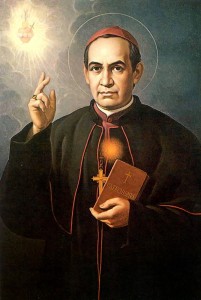Today we continue our regular series called “Learning from the Saints.” Our guide is expert Bert Ghezzi, a dear friend of mine and the author of numerous books including Voices of the Saints, Saints at Heart, and Discover Christ: Developing a Personal Relationship with Jesus.
His more recent books are The Power of Daily Mass and The Heart of Catholicism. You can learn more about Bert and his work at BertGhezzi.com.
Today, Bert profiles St. Anthony Mary Claret, a Spanish archbishop and missionary who founded the Claretians.
 By nature St. Anthony Mary Claret was an irrepressible evangelist Thoroughly modern in his outlook, he spread the gospel creatively by establishing institutions with wide-ranging impact—an international religious order, a museum, publishing ventures, libraries, professional associations, schools, and cultural centers.
By nature St. Anthony Mary Claret was an irrepressible evangelist Thoroughly modern in his outlook, he spread the gospel creatively by establishing institutions with wide-ranging impact—an international religious order, a museum, publishing ventures, libraries, professional associations, schools, and cultural centers.
Frustrated as a young priest in his effort to join a missionary order, in the 1840s Anthony plunged himself into the evangelization of Catalonia, his home province in Spain. He wove ancient Christian wisdom into fresh contemporary strategy and tactics for evangelization that he articulated in his Autobiography. In the following excerpt, for example, he explains why evangelists must temper their zeal with meekness:
“Jesus told his disciples, “Learn from me, for I am gentle and humble in heart, and you will find rest for your souls” (Mt 11:29). Humility is like the root of the tree, and gentleness its fruit. We please God by humility and our neighbors by gentleness.
No virtue is so attractive as gentleness. If your throw little pieces of bread into a pond, the fish will come fearlessly up to your feet. But if you throw rocks, they will swim away and hide. Jesus Christ was gentleness itself, and because of this virtue he is called the Lamb. The prophets foretold that he would be persecuted and yet remain silent. But by his suffering and silence he redeemed us and taught us how we must act to save the souls he has entrusted to us.
Bad temper and anger—the lack of gentleness—often masquerades as zeal. I have studied the distinction between them, so as not to make a crucial mistake. The function of zeal is to abhor, flee, renounce, combat and overthrow everything that is contrary to God.
But zeal is an ardent and violent love that needs to be wisely controlled. Otherwise it might go beyond the limits of modesty and discretion. Moved by anger it fails to keep within the bounds of reason and pushes the heart to disorder.
My God, give me a zeal that is discreet and prudent so that I may do everything strongly yet sweetly, gently yet strongly.”
Apostolic zeal impelled St. Anthony himself. Lifelong he preached ten thousand sermons and published two hundred books and pamphlets. In 1847 he founded the very successful Religious Library, a publishing venture that distributed five million books and four million leaflets in two decades. At the same time Anthony organized his priest collaborators as Missionary Sons of the Immaculate Heart of Mary, now called Claretians.
Appointed Archbishop of Santiago, Cuba, in 1850, St. Anthony set about reforming a diocese that had been untended for fourteen years. His intensive efforts to revitalize the church on the island met considerable resistance. Once he was seriously wounded by a man whose mistress he had converted.
In 1857 he resigned his post and returned to Spain, where he served the rest of his life as chaplain to Queen Isabella II. His position at court restricted his impulse to evangelize, but he channeled his energy into founding a scientific laboratory, music and language schools, and a museum. He also worked with the Claretians, reorienting his community to continue his work in the contemporary world.
Revolution in Spain in 1868 drove the saint into exile with the queen. He died in Rome in 1870.
“O my God, I give you my word that I shall preach, write and circulate good books and pamphlets in abundance , so as to drown evil in a flood of good.”
— St. Anthony Mary Claret
(Image Credit: SaintsInRome.com)
Read more from Bert at his website www.BertGhezzi.com, or check out his many books on Amazon.

